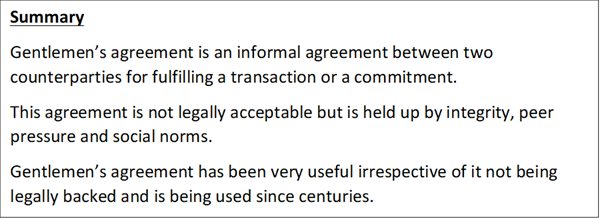What do you mean by Gentlemen’s Agreement?
A gentlemen’s agreement is a casual, frequently unwritten understanding or exchange sponsored simply by the trustworthiness of the counterparty to keep its terms. An arrangement, for example, is, for the most part casual, made orally and isn’t legitimately restricting.
Despite their casual nature, the violation of a gentlemen’s understanding one could negatively affect business connections on the chance that one gathering chooses to renege on their guarantee. The gentlemen’s agreement may likewise be known as a “gentleman’s arrangement,” and could be fulfilled by a handshake.

Copyright © 2021 Kalkine Media
Understanding Gentlemen’s Agreement
A gentleman's arrangement, being to a greater extent a vital matter and behavior, depends on the restraint of at least two gatherings to satisfy spoken or implicit commitments. In contrast to an official agreement or lawful arrangement, there is no court-directed review if the deal is broken.
Gentlemen’s arrangements have been generally made in global exchange and relations, just as in many businesses. Gentlemen's agreements were prevalent at introducing the mechanical age and well into the top half of the 1900s, as guidelines regularly slacked new strategic policies. Such arrangements were discovered to be being used to control costs and breaking point rivalry in the steel, iron, water, and tobacco enterprises, among others.
Gentlemen’s agreements among industry and the US government were regular during the 1800s and mid-1900s. The Bureau of Corporations, an archetype to the Federal Trade Commission, was framed in 1903 to research monopolistic practices.
Sometimes, what came about were noble men's arrangements in which Wall Street lenders, like JP Morgan and his "House of Morgan," would meet with the authority to get earlier freedom on consolidations and takeovers. One such model was the gentlemen’s agreement that had controllers and the President disregard the Sherman Antitrust Act to allow United States Steel Corp. to turn into the world's initial billion-dollar organisation.

Copyright © 2021 Kalkine Media
In 1907, a securities exchange alarm that hit a few central venture banks prompted a monetary emergency. The frenzy prompted President Theodore Roosevelt to work intimately with JP Morgan to combine banks under the contention that doing so would fight off a more significant crisis. Also, in 1907 Morgan again worked with Roosevelt to make a gentlemen’s agreement that would allow US Steel to get its biggest rival, Tennessee Coal and Iron, in an unwritten and implicit guideline that disregarded the Sherman Act.
Gentlemen’s arrangements may likewise be found in exchange deals and global relations. One model is the Gentlemen's Agreement of 1907 that saw the United States and the Empire of Japan address migration from Japan and the helpless treatment of Japanese foreigners effectively in America. The arrangement, never approved by Congress, saw Japan consent to presently don't give travel papers to people trying to move to America for work. The US, thus, would currently don't permit separation and isolation of Japanese residents living in America.
Gentlemen’s agreements have come to direct global exercises, for example, the coordination of financial or exchange policies. According to Edmund Osma?czyk in the Encyclopedia of the United Nations and International Agreements, it is additionally characterised as "a worldwide term for an understanding made orally instead of recorded as a hard copy, yet completely legitimately valid." This sort of understanding may permit a country to stay away from the homegrown lawful prerequisites to go into a formal treaty, or it very well might be helpful when an administrator needs to go into a mysterious arrangement that isn't restricting upon the following administration.
According to another creator, all peaceful accords are refined gentlemen's arrangements since, shy of war, they are all unenforceable. Osma?czyk called attention to that there is a distinction between open gentlemen's arrangements and secret diplomatic agreements. In the US, a disallowance against gentlemen’s arrangements in business relations between states was presented in 1890 because the clandestine idea of such arrangements was outside anybody's ability to control.
In English agreement law, for consent to be restricting, there should be a goal to make lawful relations. Yet, in business dealings (for example, arrangements that are not between relatives or companions), there is a legitimate assumption of a "goal to make lawful relations."
Frequently Asked Questions
What are the constraints of the Gentlemen’s Agreement?
A gentlemen's agreement might be made to participate in serious rivalries, for example, value fixing or exchange shares. Since a gentlemen’s agreement is implicit—not resolved to paper as a legal, official agreement—it very well might be utilised to make and force unlawful decisions.
Much of the time, the outcome might be more significant expenses or lower quality items for buyers. More regrettable yet, a gentlemen’s arrangement might be utilized as a way to advance oppressive practices.
Since they are casual and frequently not recorded, Gentlemen's arrangements don't have the very lawful and administrative assurances set up that a conventional agreement has. Accordingly, they are harder to implement.
 Please wait processing your request...
Please wait processing your request...